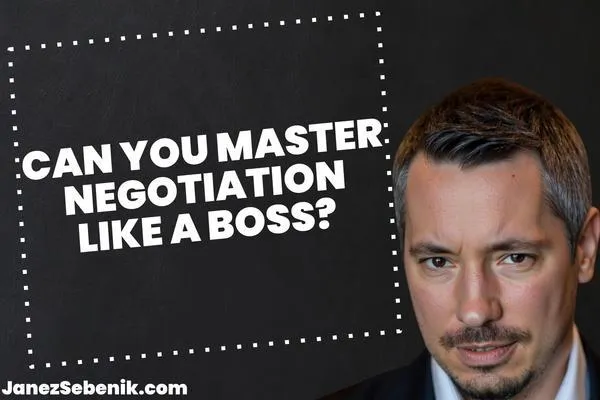
What are the 4 golden rules of negotiation?
Want to win big in negotiations? It's not about being tough or smooth-talking. It's about knowing the rules of the game.
The 4 golden rules of negotiation are preparation, building trust, active listening, and keeping your cool. These simple rules can help you get better deals in business and life.
By following these rules, you'll be ready for any negotiation. You'll connect with the other side, understand their needs, and stay calm under pressure. It's like having a secret weapon in your pocket.
Key Takeaways
Prepare thoroughly before any negotiation to boost your confidence and set clear goals
Build trust and strong relationships to create win-win outcomes
Listen actively and control your emotions to navigate tough talks successfully
Understanding the Basics of Negotiation
Negotiation is a skill you can learn and master. It's not just for big business deals - you use it every day. Let's break it down so you can start winning more often.
Defining Negotiation
Negotiation is simple. It's just you trying to get what you want from someone else. But here's the twist - they're trying to do the same thing.
You're not just arm-wrestling over a deal. It's more like a dance. You both have goals, and you're trying to find a way to meet in the middle.
The best negotiations end with both sides feeling good. That's called a win-win outcome. It's not about crushing the other person - it's about finding a solution that works for everyone.
Your negotiation skills can make or break a deal. The better you get, the more you'll win in life. Think of it like a superpower - one that can get you better jobs, better deals, and better relationships.
The negotiation process isn't rocket science. You prepare, you talk, you listen, and you work towards an agreement. Simple, right? But like anything worth doing, it takes practice to get good at it.
First Golden Rule: Preparation and Planning
Getting ready for a negotiation is like prepping for a big game. You need to know your stuff and have a game plan. Let's break it down.
Research and Information Gathering
You gotta do your homework. Dig deep into the other side's background, interests, and past deals. Know their strengths and weaknesses like the back of your hand.
Check out their company financials, recent news, and market position. It's like having X-ray vision into their world.
Talk to people who've dealt with them before. Get the inside scoop. The more intel you have, the stronger your position.
Don't forget to know your own stuff too. Be ready to answer tough questions about your own situation.
Setting Clear Goals
Know what you want before you walk in the room. Set specific targets for what you need to walk away happy.
Figure out your bottom line - the point where you'll walk away. It's your safety net.
Think about what the other side wants too. How can you help them win while still getting what you need?
Write down your goals. Make them clear and measurable. "Get a good deal" is too vague. "Increase profit margin by 5%" is spot on.
Have a backup plan ready. What if things don't go your way? Always be ready to pivot.
Second Golden Rule: Building Relationships
Building relationships is key to successful negotiations. It's not just about winning, it's about creating connections that last. Let's dive into how you can make this work for you.
Trust as the Foundation
Trust is the secret sauce in negotiations. Without it, you're toast. So how do you build it?
Be honest. Always. Even when it's hard.
Keep your promises. If you say you'll do something, do it.
Show respect. Treat the other person like a human, not just a business deal.
Active listening is crucial. When they talk, really listen. Don't just wait for your turn to speak.
Share information. The more open you are, the more they'll open up too.
Understanding the Other Party
To win, you need to know what the other side wants. It's like being a mind reader, but easier.
Ask questions. Lots of them. The more you know, the better.
Put yourself in their shoes. What would you want if you were them?
Pay attention to body language. It often says more than words.
Be flexible. Their needs might change during the negotiation. Be ready to adjust.
Remember, it's not just about the deal. It's about the relationship. If you can build a strong one, you'll win in the long run.
Third Golden Rule: Active Listening
Pay attention and shut up. It's that simple. Active listening is your secret weapon in negotiations. It'll help you win more deals and make better ones.
Effective Communication
Active listening is like a superpower in negotiations. It's not just hearing words, it's understanding the message behind them.
You gotta use your ears more than your mouth. Let the other person talk. Don't interrupt. When they're done, ask questions to clarify.
Show you're listening with small nods or "uh-huhs". It makes people feel heard and respected. They'll open up more.
Repeat key points back in your own words. It shows you get it and gives them a chance to correct any misunderstandings.
Reading Between the Lines
Listen for what's not being said. Body language, tone, and hesitations can tell you a lot.
Look for emotions behind the words. Are they excited? Nervous? Frustrated? Understanding their feelings can help you find solutions.
Pay attention to repeated phrases or topics. They're usually important to the other person.
Don't assume you know what they mean. If something's unclear, ask. It's better to clarify now than misunderstand later.
Fourth Golden Rule: Emotional Control
Keeping your cool is crucial in negotiations. It's all about staying level-headed and patient, even when things get heated.
Keeping Cool Under Pressure
You've got to stay calm when the stakes are high. Don't let your emotions take the wheel.
Take deep breaths. Count to ten if you need to. Remember, it's not personal, it's business.
If you feel yourself getting worked up, take a quick break. Grab some water or hit the restroom. Use that time to reset.
Build trust with the other side. Show them you're in control of your emotions. They'll respect you more for it.
Practice active listening. Focus on what they're saying, not on your next move. This keeps you present and less likely to react emotionally.
Patience Pays Off
Rushing leads to mistakes. Take your time and let the process unfold naturally.
Don't feel pressured to make quick decisions. If you need time to think, ask for it. It's better to pause than to regret a hasty choice.
Remember, good deals often take time. Be willing to walk away if things aren't going your way. Sometimes, the best move is to regroup and try again later.
Stay flexible. If one approach isn't working, try another. Your ability to adapt can make or break a deal.
Work towards a win-win. This mindset keeps you patient and focused on the long game.
Negotiating in Practice
Negotiation skills are like muscles. You gotta use them to get stronger. Let's dive into some real-world techniques and challenges you'll face at the bargaining table.
Practical Techniques to Use
Start with the BATNA - your Best Alternative To a Negotiated Agreement. Know your walk-away point. It's your secret weapon.
Silence is golden. Use it. When the other side throws out a number, don't jump. Let it hang there. They might get nervous and improve their offer.
Ask open-ended questions. Get them talking. The more they share, the more ammo you have.
Mirror their body language. It builds trust subconsciously. Lean in when they lean in. Sit back when they do.
Always aim high. Your first offer sets the stage. Go big, but have reasons to back it up.
Common Challenges and Solutions
Fear of conflict? Reframe it. Think of it as a puzzle you're solving together, not a fight.
Dealing with a bully? Stay cool. Their aggression is often a mask for insecurity, so kill 'em with kindness.
Feeling pressured? Take a break. Say you need to check something, then use that time to regroup.
Stuck in a deadlock? Find new variables to trade. Maybe they can't budge on price, but can on delivery time.
Emotions running high? Name them. Say, "I'm feeling frustrated. How about you?" It diffuses tension fast.
